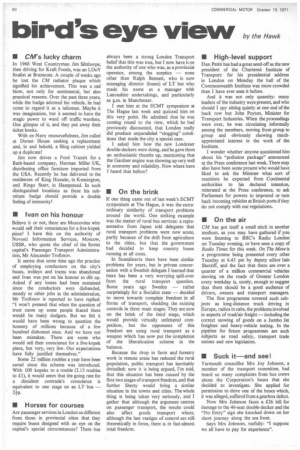• On the brink
Page 46

If you've noticed an error in this article please click here to report it so we can fix it.
If one thing came out of last week's ECMT symposium at The Hague, it was the extraordinary similarity of transport problems around the world. One striking example was the matter of rural bus services: a representative from Japan told delegates that rural transport problems were now acute, partly because of the drift from agriculture to the cities, but that the government had decided to keep country buses running at all costs.
In Scandinavia there have been similar problems for years, but in private conversation with a Swedish delegate I learned that there has been a very worrying spill-over from the rural transport question. Some years ago Sweden — rather surprisingly for a Socialist state — decided to move towards complete freedom in all forms of transport, shedding the existing controls in three main stages. They are now on the brink of the third stage, which would provide virtually unfettered competition, but the opponents of this freedom are using rural transport as a weapon which has now put the completion of the liberalization scheme in the balance.
Because the drop in farm and forestry work in remote areas has reduced the rural population, public transport has inevitably dwindled; now it is being argued, I'm told, that this situation has been caused by the first two stages of transport freedom, and that further liberty would bring a similar situation in the towns and cities. The whole thing is being taken very seriously, and I gather that although the argument centres on passenger transport, the results could also affect goods transport where, although the last vestiges of control are still theoretically in force, there is in fact almost total freedom.
















































































































